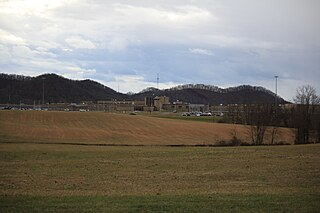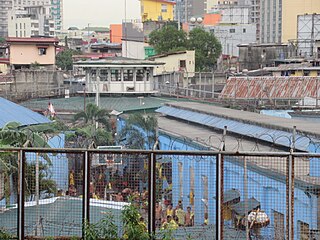
The Attica Prison Riot, also known as the Attica Prison Rebellion, the Attica Uprising, or the Attica Prison Massacre, took place at the state prison in Attica, New York; it started on September 9, 1971, and ended on September 13 with the highest number of fatalities in the history of United States prison uprisings. Of the 43 men who died, all but one guard and three inmates were killed by law enforcement gunfire when the state retook control of the prison on the final day of the uprising. The Attica Uprising has been described as an historic event in the prisoners' rights movement.

Folsom California State Prison is a California State Prison in Folsom, California, U.S., approximately 20 miles (32 km) northeast of the state capital of Sacramento. It is one of 34 adult institutions operated by the California Department of Corrections and Rehabilitation.

The New Mexico Corrections Department is a state agency of New Mexico, headquartered in unincorporated Santa Fe County, near Santa Fe. It the department operates corrections facilities, probate and parole programs, a prisoner reentry services, and an offender database.

The Arizona Department of Corrections, Rehabilitation & Reentry, commonly and formerly referred to as simply the Arizona Department of Corrections, is the statutory law enforcement agency responsible for the incarceration of inmates in 13 prisons in the U.S. state of Arizona. As of December 2015, the ADC manages over 42,643 imprisoned inmates and over 5,466 inmates who have been paroled or that are statutorily released. ADC is also in involved in recruitment and training of Correctional Officers at the Correctional Officer Training Academy (COTA) in Tucson, Arizona. The ADC is headquartered in Downtown Phoenix.
The Department of Corrections is the public service department of New Zealand charged with managing the New Zealand corrections system. This includes the operations of the 18 prisons in New Zealand and services run by Probation. Corrections' role and functions were defined and clarified with the passing of the Corrections Act 2004. In early 2006, Corrections officially adopted the Māori name Ara Poutama Aotearoa.
Parklea Correctional Centre, a privately managed Australian maximum and minimum security prison for males, is located at Parklea, in the north-western suburbs of Sydney, New South Wales. The facility is operated by MTC Ventia and has a current capacity for 1,350 inmates. The Centre accepts prisoners charged and convicted under New South Wales and/or Commonwealth legislation and incorporates a minimum-security work-release centre for inmates nearing release with a capacity of 120. A Compulsory Drug Treatment Correctional unit is incorporated within the centre.

CoreCivic, formerly the Corrections Corporation of America (CCA), is a company that owns and manages private prisons and detention centers and operates others on a concession basis. Co-founded in 1983 in Nashville, Tennessee by Thomas W. Beasley, Robert Crants, and T. Don Hutto, it received investments from the Tennessee Valley Authority, Vanderbilt University, and Jack C. Massey, the founder of Hospital Corporation of America.
A prison riot is an act of concerted defiance or disorder by a group of prisoners against the prison administrators, prison officers, or other groups of prisoners.

William C. Holman Correctional Facility is an Alabama Department of Corrections prison located in Atmore, Alabama. The facility is along Alabama State Highway 21, 9 miles (14 km) north of Atmore in southern Alabama.

Oregon State Penitentiary (OSP), also known as Oregon State Prison, is a maximum security prison in the northwest United States in Salem, Oregon. Originally opened in Portland 173 years ago in 1851, it relocated to Salem fifteen years later. The 2,242-capacity prison is the oldest in the state; the all-male facility is operated by the Oregon Department of Corrections (ODOC). OSP contains an intensive management wing, which is being transformed into a psychiatric facility for mentally ill prisoners throughout Oregon.

The Southern Ohio Correctional Facility is a maximum security prison located just outside Lucasville in Scioto County, Ohio. The prison was constructed in 1972. As of 2023, the warden is Cindy Davis.

The GEO Group, Inc. (GEO) is a publicly traded C corporation that invests in private prisons and mental health facilities in the United States, Australia, South Africa, and the United Kingdom. Headquartered in Boca Raton, Florida, the company's facilities include illegal immigration detention centers, minimum security detention centers, and mental-health and residential-treatment facilities. It also operates government-owned facilities pursuant to management contracts. As of December 31, 2021, the company managed and/or owned 86,000 beds at 106 facilities. In 2019, agencies of the federal government of the United States generated 53% of the company's revenues. Up until 2021 the company was designated as a real estate investment trust, at which time the board of directors elected to reclassify as a C corporation under the stated goal of reducing the company's debt.

Kelvin Glen Davis is a New Zealand politician. He is a member of the House of Representatives, and was a senior minister in the Sixth Labour Government and the deputy leader of the New Zealand Labour Party from 2017 to 2023.
Arthur William Taylor is a high-profile former prison inmate who served time in Auckland Prison at Paremoremo, Auckland, New Zealand. In 2016 he had spent 38 years in prison and had a total of 152 convictions. As a prison inmate, he achieved a public profile as a "prison lawyer" due to initiating court action on behalf of himself and prisoners' rights. In 2017, he initiated successful legal action on behalf of former prisoner David Tamihere. On 24 January 2019, Taylor's appearance before a parole board resulted in parole being granted, and he was released on 11 February 2019. He had said not long before release that he wanted to gain a law degree and continue his social work.
Aaqqigiarvik Correctional Healing Facility is a minimum to maximum security correctional facility in Iqaluit, Nunavut, Canada. It is the largest correctional facility in the territory. During the construction phase the temporary name was Qikiqtani Correctional Healing Centre.

The COVID-19 pandemic has impacted prisons globally. There have been outbreaks of COVID-19 reported in prisons and jails around the world, with the housing density and population turnover of many prisons contributing to an increased risk of contracting the virus compared to the general population. Prison crowding and lack of sanitation measures contribute to the risk of contracting diseases in prisons and jails. As a mitigation measure, several jurisdictions have released prisoners to reduce density and attempt to reduce the spread of the illness. There have also been protests among prisoners, riots and prison breaks in multiple countries in response to prisoner anger over their risk of contracting illness in prison conditions. Before the COVID-19 pandemic, health services within prisons had issues providing adequate care for incarcerated people, and this has only been exacerbated by the impacts of COVID-19. Minority groups within the prison system have been disproportionately affected by the COVID-19 pandemic.

Rawiri Wikuki Waititi is a New Zealand politician and co-leader of Te Pāti Māori alongside Debbie Ngarewa-Packer. He has served as the Member of Parliament (MP) for Waiariki since 2020, when his election returned Te Pāti Māori to the New Zealand Parliament following their defeat at the 2017 general election.

The Manila City Jail, popularly known as Old Bilibid Prison, is a detention center in Manila, Philippines. It is one of the most overcrowded jails in the world.
Incarceration in Oklahoma is how inmates are rehabilitated and reformed. Incarceration in Oklahoma includes state prisons and county and city jails. Oklahoma has the second highest state incarceration rate in the United States. Oklahoma is the second in women's incarceration in the United States. After becoming a state in 1907, the first prisons were opened and reform began.